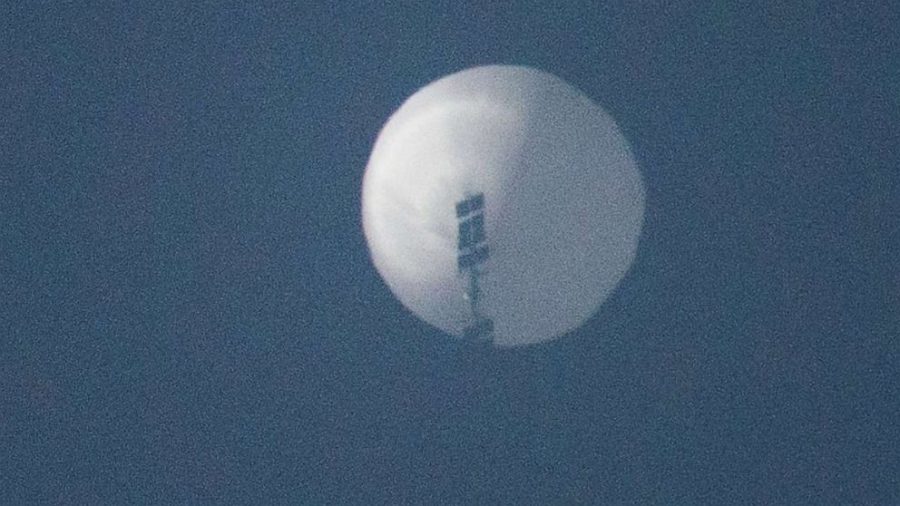The United States Was Right to Burst China’s Bubble
The balloon found floating over the U.S. on Wednesday, Feb. 1 was discovered to be a Chinese craft meant to gather intelligence, and the U.S. government was right to shoot it down. This was days after it had first entered American airspace over Alaska, re-entered over Idaho and eventually moved along the jet stream to Montana, where many citizens spotted it, describing it as a “big round disk in the sky.”
After days of travel across the U.S. and multiple statements from both the Biden administration and the Chinese Foreign Ministry, the balloon was shot down by an F-22 six miles off the coast of South Carolina.
But many question whether the actions taken, such as shooting down the balloon and canceling the Secretary of State Anthony Blinkin’s diplomatic trip to Beijing, were overreactions. The simple answer is no, they weren’t overreactions.
First, the balloon was not a weather craft as the Chinese Foreign Ministry had claimed; instead, according to the U.S. government, it was undoubtedly a balloon equipped with instruments for espionage, such as camera surveillance technology. While the balloon did not gather much more than what Chinese satellites can already glean from space, the balloon entered U.S. airspace, put bases on alert and disrupted air travel in multiple states. Therefore, while not an immediate threat to the U.S. or its citizens, the balloon was still a threat and a clear breach of U.S. sovereignty.
During a time when state sovereignty is being challenged through Russia’s invasion of Ukraine, a visible breach of this extent should not be allowed to continue without attention and response.
Additionally, while flying over Montana, the balloon alarmed Pentagon officials because the state is home to the 341st Missile Wing at Malmstrom Air Force Base, one of three U.S. Air Force bases that operate and maintain intercontinental ballistic missiles. Moreover, the balloon would have passed over multiple other IBM sites through its path in the jet stream. This prospect made the balloon much more dangerous than it originally seemed.
Finally, the balloon was posted to social media, where the whole world watched a spy balloon fly across the U.S. Perhaps if the balloon stayed high enough that it couldn’t be seen from the ground, the Biden administration would have been able to remain passive; however, within view, this was not an option. Had Biden not taken action, the world would be watching a blatant breach of sovereignty go ignored.
As for the question of whether the government under-reacted, the answer is the same as before; no, the actions were not an underreaction. As a whole, the situation was handled in a manner befitting the offense. Nevertheless, there are people on Twitter calling for the invasion of China over the incident. This is both detrimental to the country’s health and an unrealistic response.
The balloon was said to be relatively harmless — but shooting it down, especially over the ocean where no damage to people or infrastructure could occur, was the correct decision. The breach of sovereignty and careless espionage from China could not be allowed to continue unchecked.
Moreover, the tension added to US-China relations from shooting down the balloon is an unfortunate byproduct of a necessary action. It would not be responsible for the U.S. to have allowed a foreign aircraft to float around its airspace unchecked. Regardless of whether or not the U.S. shot down the balloon, relations would have been damaged because of the balloon’s presence. The State Department would still remember the breach of sovereignty; it would simply be less public. In this case, China’s anger, while predictable, is not justified as they were the aggressor in this scenario.
The only action that could be considered an overreaction is the cancellation of Secretary Blinkin’s diplomatic trip to Beijing. Tensions have escalated over the incident; however, it is an objectively minor issue. Jessica Chen Weiss, a political scientist at Cornell University, said the decision to cancel Mr. Blinken’s trip “confirms the low expectations going into the trip, that the potential upside should have been so outweighed by the domestic political risks of visiting Beijing amid congressional outrage.” The trip could have served to resolve damaged relations from the incident and helped move forward discussions about more significant issues such as the economy and Ukraine. Instead, by canceling, many lines of dialogue were closed off. That being said, while canceling the trip was a bit extreme, it was not unreasonable or unjustified.
Overall, the reaction by the Biden administration and the general public has been precisely what the situation warrants. Moreover, the memes which have been prevalent online only prove that the situation, while not meaningless, was not overly serious.
Claire Bickel, FCRH 24, is a Political Science and International Political Economy major from Branford, CT










































































































































































































